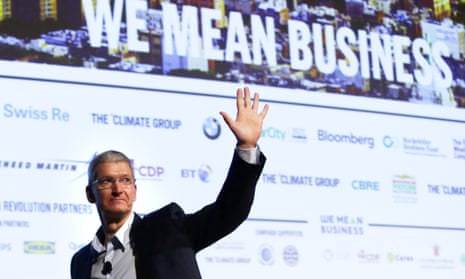Tim Cook is the CEO of Apple, possibly the world’s most innovative company and inarguably its most valuable – just ahead of fossil-fuel giant ExxonMobil. So his appearance at the opening of Climate Week 2014 on Monday lent a little celebrity buzz to a day which otherwise had a been-there-done-that feeling about it.
The climate change issue, Cook told a gathering of business and political leaders in New York, resonates with Apple’s workers and with its customers, which is why the company has moved from environmental laggard to green leader in recent years, winning plaudits even from Greenpeace.
“The long-term consequences of not addressing climate are huge,” he said. “I don’t think anyone can overstate that.”
Cook said he doesn’t believe there’s a tradeoff between the economy and the environment. “If you innovate and you set the bar high, you will find a way to do both,” he said. “You must do both.”
One example? The company is building its new headquarters, which, Cook expects will be “the greenest building on the planet”.
None of this came as a surprise. Apple hired Lisa Jackson, the well-respected former EPA chief, to lead its sustainability efforts last year, and the company has signed the Climate Declaration, which describers tackling climate change as “one of America’s greatest opportunities of the 21st century”.
And at Apple’s annual shareholder meeting in March, Cook bluntly told a critic of the company’s sustainability efforts that “if you want me to do things only for ROI (return on investment) reasons, you should get out of this stock.”
This week, Cook, who is 53, described climate change as a defining issue for his generation. “Boomers have to look at ourselves deeply and ask if we want to be the first generation who leaves the world worse off,” he said.
Cook was one of the few fresh faces to appear in the course of a day when The Climate Group, the nonprofit organizer of the kickoff event, trotted out mostly veterans of the climate wars: CEO Paul Polman of Unilever, Richard Branson of the Virgin empire, Ikea CEO Peter Agnefjäll and chief sustainability officer Steve Howard, Aron Cramer of BSR and Peter Bakker of the World Business Council for Sustainable Development.
To no one’s surprise, UN chief Ban Ki-moon declared: “We must have this global climate change agreement by 2015.” John Kerry, the US secretary of state, said: “It is absolutely imperative that we decide to move and act now.”
Meanwhile, Unilever’s Polman said that the world’s leading companies “are asking for a price on carbon” and for an end to the “perverse subsidies” for climate-destroying fossil fuels. And Ikea’s Agnefjäll added: “We want to have a positive impact on people and the planet.”
Well, sure. The trouble is, corporate executives have been mouthing such platitudes for years.
Despite all of the big talk and the big goals – GE’s Ecomagination, Walmart’s sustainability commitments, IBM’s Smart Cities program and all the rest – many companies around the world continue to grow production based on power plants that burn coal and natural gas, making the overall problem worse, not better.
Just last weekend, scientists reported that global emissions of greenhouse gases rose by 2.3% in 2013 to record levels, with much of that growth driven by the industrialization of China and India.
That’s not unexpected given there is little or no regulation of greenhouse gases in China or the US, the world’s two leading emitters, and no appetite for curbing emissions in much of the developing world, where more than 1 billion people live without electricity. Apple may build green headquarters and carbon-neutral data centers, but its suppliers in China who manufacture iPhones and iPads generate tons of climate pollution.
This is why some longtime climate warriors argue that companies must get serious about spending their political capital on behalf of pricing carbon. As climate activist Charles Komanoff put it this week: “A carbon tax is the only way for the climate damage caused by burning fossil fuels to be brought inside the arc of individual and societal decision-making that determines how much of those fuels society uses and, thus, how much carbon it emits.”
BSR’s Cramer, an organizer of the new, broad-based We Mean Business coalition, also argues that voluntary corporate commitments won’t get us where we need to go. “It is the best companies that understand the limitations of what they can do on their own,” he said.
Some see signs of progress. Mike Barry, the sustainability chief at retailer Marks & Spencer, told me: “I sense that behind the usual suspects this time there are hundreds and maybe thousands of companies lined up. Business needs to become political with a small ‘p’.”
Ikea’s Howard went further. “I think this is a watershed moment,” he said. Increasingly, companies understand the costs and risks of climate inaction, and they are ready to make low-carbon investments, he said. “It’s created a buzz in the business community.”
Better late than never. As Cook put it: “From our point of view, the time for inaction has passed.”
The values-led business hub is funded by SC Johnson. All content is editorially independent except for pieces labelled advertisement feature. Find out more here.

Comments (…)
Sign in or create your Guardian account to join the discussion